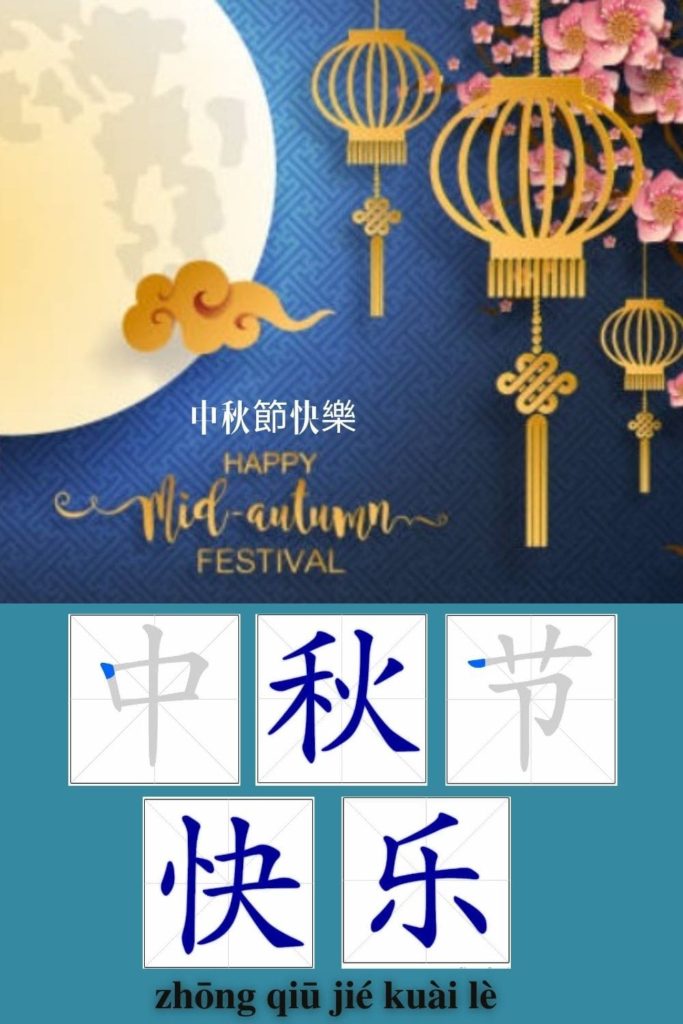Moon cake festival is the second most important festival celebrated in China. Outside of China, especially in Singapore, it is just a day we get to eat moon cakes and nothing else.
Moon cake festival is also known as Mid-Autumn festival, August Month festival or Autumn festival because the festival falls on the Eighth month of the lunar calendar.
The term “Mid-Autumn 中秋Zhōng qiū” first appeared in the book Rites of Zhou (周礼), written in the Warring States Period. The celebration of Moon cake festival started during the Song dynasty and only became one of the most important festivals in China during the Qing and Ming dynasties.

Moon worshipping
Moon worshipping is a custom practiced since ancient times. According to Ancient historical data, during the Zhou dynasty, the Emperor already had the custom of worshipping the Sun in Spring; the earth in summer; the moon in Autumn and lastly the sky in Winter.
This custom of moon worshipping was not only pursued by the palace and rich merchants, but also widely influenced the common people. As the dynasties changed, moon worshipping 祭月(Jì yuè) became admiration of the moon 赏月(shǎng yuè).
.
Story of Moon Cake Festivals
There are various versions to this story.
Version 1
During the Tang dynasty, Emperor Li Shimin (太宗李世民), second emperor of the Tang Dynasty, ordered to conquer the Turks in order to maintain stability in the Northern border. He sent his general (大将 Dà jiàng) Li Jing(李靖 Lǐ jìng) to war with the Turks. Li Jing fought for many years and finally won on the 15th day of August and returned to the capital.
In order to celebrate the victory, the capital was filled with the sound of cannons and music. A Tibetan businessman, who was doing business with the capital at that time, presented a round cake to the Emperor to celebrate his victory against the Turks. The Emperor was very happy and took the round cake out from the gorgeously decorated box. He then said “应将胡饼邀蟾蜍. Yīng jiāng hú bǐng yāo chán chú. The 胡饼 refers to the round cake received from the nomads (businessman from Tibet); 蟾蜍 means the moon (lit means toad). The meaning of this phrase is “round cake from the Hu meets the round moon”. After saying this, Emperor Li shared the round cake with all his officials. Since then, the eating of moon cake festival passed down from generations to generations.
Version 2
Towards the end of Yuan dynasty (元朝 Yuán cháo), the common people raise up against the Yuan dynasty because they could no longer endure their brutal rule. Zhu Yuan Zhang (朱元璋 Zhū yuán zhāng) and his rebel army started a resistance war against the Yuan dynasty. However, as the army was closely watched by the imperial soldiers, it was very difficult for the rebel armies to contact each other. At that time, military adviser Liu Bo Wen (刘伯温 Liú bó wēn) came up with a great idea. He ordered his soldiers to put a note “八月十五杀鞑子 Bā yuè shí wǔ shā dá zi” inside the moon cake to inform the rebel army soldiers to rise up against the dynasty on the 15th of August. This method escaped the surveillance of the imperial soldiers.
On the 15th of August, the rebel army fought against the Yuan dynasty. General Xu Da (徐达Xú dá) conquered the city and overthrew the Yuan dynasty. When Zhu Yuan Zhang heard the news, he was delighted and decided to use moon cakes as an annual cake to celebrate this victory with his officials on every 15th day of August. This custom also spread to the common people.
Version 3
Legend has it that there were once ten suns in the sky. The heat from the suns made the plant withered and the lake dry. It was really impossible to live under the tremendous heat.
A young man, named Houyi ( 后羿 Hòu yì), who was good at archery, sympathized with the people and decided to help them. One day, he took his bow and arrows, headed up to Mt Kunlun and shot down nine suns.
People were very grateful of Houyi and regarded him as a hero. And, many came from afar to learn archery from him. One of the man was FengMeng (逢蒙 Féng méng).
Houyi had a wife called Chang er. He loved his wife very much and spent most of his time with her. One day, Houyi went to Mt. Kunlun and the heavenly queen mother gave him a medicinal potion which had immortality power. And, once eaten, the person could ascend to the heaven.
As Houyi loved his wife, he could not bear to leave her alone. He asked Chang er to keep the pill well while he tried to persuade the heavenly queen mother to give him another pill. All these time, Houyi’s disciple FengMeng saw everything and decided to steal the pill for himself.
One day, Houyi invited his disciples to go hunting, Feng Meng pretended to be sick and stayed home. When he left, Feng Meng forced Chang er to hand him the immortality pill. As Chang er knew she could not fend off Feng Meng, she took out the pill and ate it. As soon as she ate the pill, Chang er ascended to the heaven and became a moon fairy because the moon is closest to earth.
When Houyi came home from hunting, he was devastated to hear what had happened to his beloved wife. At that moment, he stared at the moon and saw a shadow that resembled his wife, Chang er. He then ordered his servants to prepare all the food that Chang er loved and worshipped the moon. When the people of the country heard about this, they too worship the moon and this custom spread from generations to generations.
Which version do you believe? No matter which version is true, one thing for sure is that we get to eat delicious moon cakes on every 15th day of August.
